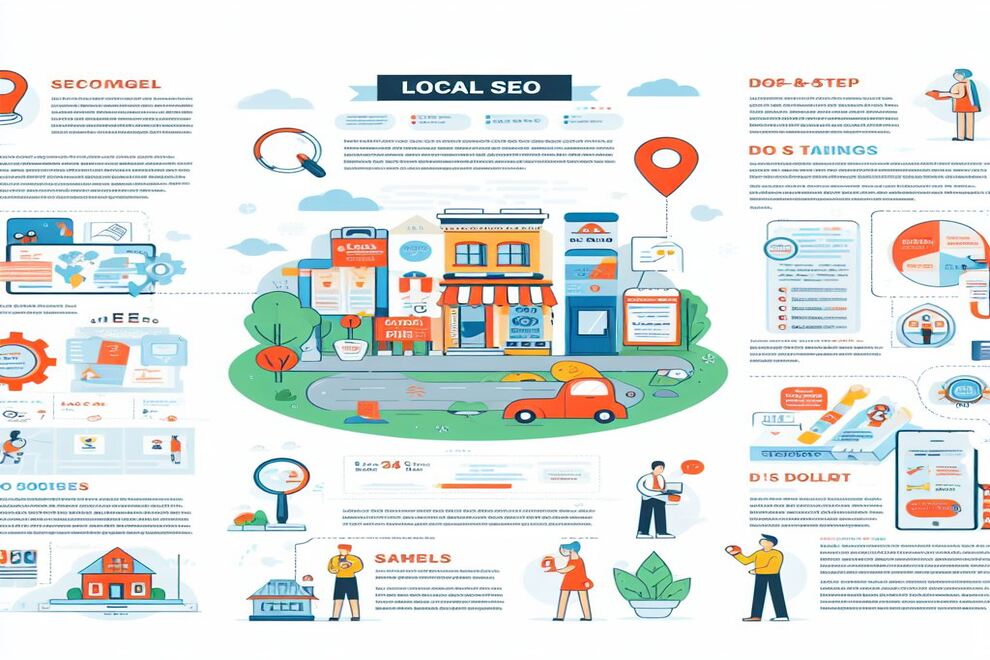The Importance of Local SEO for Small Businesses

In an era where consumers turn to the Internet for virtually every need, having a strong online presence is essential for businesses of all sizes. For small businesses, in particular, local search engine optimization (SEO) is a game-changer. It’s not just about visibility; it’s about being found by the right audience in your local area. In this comprehensive guide, we’ll explore the importance of local SEO for small businesses, strategies to succeed, and how to make the most of this digital marketing tool.
Understanding Local SEO
What Is Local SEO?
Local SEO is a branch of search engine optimization that focuses on improving a business’s visibility in local search results. It’s about ensuring that when people search for products or services in their area, your business appears in the top results.
Why Is Local SEO Important?
Local SEO is crucial because it connects businesses with nearby customers. When potential customers search for a product or service, they often include location-specific terms, such as “near me” or the name of their city or neighborhood. Optimizing for local search helps businesses capture this local intent and drive foot traffic or online sales.
The Benefits of Local SEO for Small Businesses
1. Increased Online Visibility
Local SEO efforts can improve your business’s ranking in search engine results pages (SERPs). This means your business is more likely to be seen by potential customers.
2. Targeted Traffic
Local SEO helps you attract visitors who are actively seeking your products or services in your area. These visitors are more likely to convert into customers because they have specific intent.
3. Improved Credibility
Showing up in local search results lends credibility to your business. Customers often trust businesses that appear at the top of search results as authoritative and reliable.
4. Competitive Advantage
Small businesses that invest in local SEO can gain a competitive edge over others that don’t. This can be especially advantageous in crowded markets.
5. Cost-Effective Marketing
Local SEO is cost-effective compared to traditional advertising. You can reach a highly targeted local audience without spending a fortune on marketing.
6. Enhanced Mobile Experience
Mobile device users often perform local searches, making local SEO critical for reaching users on the go. Google’s emphasis on mobile-first indexing further highlights the importance of mobile optimization for local businesses.
Key Strategies for Local SEO Success
1. Optimize Your Google My Business (GMB) Profile
A complete and well-optimized GMB profile is a fundamental component of local SEO. Ensure your profile includes accurate business information, such as your name, address, phone number, website, and hours of operation. Upload high-quality photos and encourage customers to leave reviews.
2. Keyword Research
Identify relevant local keywords that potential customers might use to find businesses like yours. Include location-specific terms in your keyword strategy.
3. On-Page Optimization
Optimize your website’s on-page elements, including meta titles, meta descriptions, and header tags, to incorporate local keywords. Make sure your website is easy to navigate and user-friendly.
4. Content Creation
Produce high-quality, localized content that provides value to your audience. Blog posts, articles, and resource pages can help establish your expertise and improve search rankings.
5. Backlink Building
Earn high-quality backlinks from local websites, directories, and business organizations. These backlinks can enhance your local authority and improve your search engine rankings.
6. Mobile Optimization
Ensure your website is responsive and mobile-friendly. With the increasing use of smartphones for local searches, a mobile-optimized site is essential.
7. Online Reviews
Encourage customers to leave reviews on your GMB profile and other review platforms. Positive reviews can boost your local SEO efforts and build trust with potential customers.
8. Schema Markup
Implement schema markup to provide search engines with structured data about your business. This can enhance your appearance in search results and help search engines understand your content.
9. Local Citations
Ensure your business is listed accurately in local directories, citation sites, and social platforms. Consistency in your business information across the web is critical for local SEO.
10. Monitor and Adjust
Regularly monitor your local SEO performance using tools like Google Analytics and Google Search Console. Make necessary adjustments to your strategy based on the data you gather.
The Impact of Google’s Local Pack
Google’s Local Pack is a prominent feature in local search results. It’s the section that appears at the top of the page, showing a map and a list of local businesses related to the search query. Earning a spot in the Local Pack can significantly boost your visibility and traffic.
Local SEO Success Stories
To illustrate the impact of local SEO, let’s look at a couple of success stories:
1. Casey’s New Orleans Snowballs
Casey’s New Orleans Snowballs, a small snowball stand in New Orleans, Louisiana, saw a 40% increase in revenue after implementing a local SEO strategy. By optimizing their website, Google My Business profile, and encouraging customer reviews, they attracted more local customers.
2. Dr. Jim Ellis
Dr. Jim Ellis, a dentist in Huntsville, Alabama, increased his practice’s website traffic by 70% and added 100 new patients in just six months through a comprehensive local SEO campaign. By optimizing his website, generating reviews, and targeting local keywords, his practice experienced substantial growth.
Measuring Local SEO Success
To gauge the effectiveness of your local SEO efforts, track the following key performance indicators:
1. Organic Traffic
Monitor the amount of organic traffic coming to your website from local search queries. An increase in organic traffic is a positive sign of local SEO success.
2. Click-Through Rate (CTR)
Examine the click-through rates for your local search results. Higher CTRs indicate that your listings are compelling to users.
3. Conversion Rate
Evaluate the conversion rate of visitors from local searches. A higher conversion rate indicates that your website is effectively persuading visitors to take action, such as making a purchase or contacting your business.
4. Online Reviews
Track the quantity and quality of online reviews on platforms like Google, Yelp, and Facebook. Positive reviews can significantly impact your local SEO efforts.
5. GMB Insights
Review the data in your Google My Business Insights to understand how users find your business and interact with your GMB profile.
Conclusion
Local SEO is not just an option for small businesses; it’s a necessity. It’s the key to attracting local customers, building credibility, and staying competitive in the digital age. By implementing the strategies outlined in this guide and continuously monitoring your local SEO performance, you can ensure that your small business remains visible and accessible to your local audience. The benefits of local SEO, from increased online visibility to cost-effective marketing, are too valuable to overlook. Invest in your local SEO efforts and watch your business thrive in the local market.





